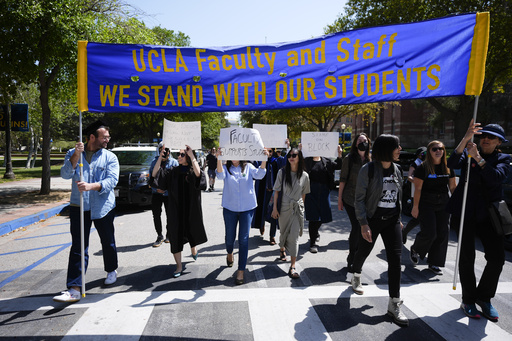
Dissent is flourishing this autumn across American universities, transcending the realm of just student activists. With new limitations placed on student protests, faculty have stepped forward to advocate for the right to assemble and express opinions freely.
For faculty members, these recently introduced protest regulations are perceived as a threat to both freedom of expression and the fundamental right to engage in critical thought, which are essential components of university culture. This semester, notable demonstrations have featured professors advocating for the right itself to protest.
Last spring saw pro-Palestinian tent camps on various campuses, which interrupted graduation ceremonies and engendered accusations of antisemitism, subsequently resulting in stricter guidelines. In August, Indiana University implemented an “expressive activity policy” that limits protests past 11 p.m., bans camping on campus, and necessitates prior approval for signs. Despite these restrictions, a coalition of faculty, students, and community members continues to hold candlelight vigils on Sundays that push beyond the designated deadline.
Russ Skiba, a professor emeritus who participates in these vigils, argues that the new limits signify a broader attempt to stifle academic freedom across educational institutions. In Indiana, a law signed by the Republican governor in March aims to intensify state regulation of public universities. This legislation, introduced by a lawmaker who criticized colleges for possessing “monolithic thinking,” demands post-tenure evaluations concerning faculty’s promotion of diverse viewpoints and the management of their personal beliefs within the classroom. Skiba and numerous Indiana educators expressed strong opposition to the bill, labeling it as ambiguous and open to interpretation.
“Universities symbolize the essence of free speech; however, when an anti-democratic sentiment surfaces, one of the first casualties is freedom of expression,” Skiba commented.
Across the nation, faculty members at various institutions have responded to these new guidelines with protests, vigils, and calls for clarification. On October 16, a group of professors from Harvard University organized a “study-in” at a library to show solidarity with pro-Palestinian students who were temporarily barred from the library for a previous demonstration. In September, University of California faculty members filed a complaint alleging that the system’s actions were intended to undermine their academic freedom and stifle discussions around the Israel-Hamas conflict that do not conform to the institution’s stance.
Some educators view these protest limitations as a labor dispute. Tenure has become less common, and there is increasing pressure in certain areas to eliminate it entirely. In multiple states, legislatures are scrutinizing how issues related to race, gender, and history are taught. Professors argue that admin-issued protest guidelines further diminish their role and influence in university governance.
“We need to unite as faculty and advocate for shared governance that allows us to assess and challenge these policies,” urged Todd Wolfson, a journalism and media studies professor at Rutgers University and president of the American Association of University Professors. “These changes don’t stem from the academic leadership within our institutions.”
Since the war ignited over a year ago, tensions on campuses have intensified drastically. The conflict began when Hamas militants attacked southern Israel, resulting in approximately 1,200 deaths, mostly civilians, and the kidnapping of around 250 individuals. In response, Israel’s military actions have reportedly caused over 42,000 Palestinian fatalities, as per the Gaza Health Ministry, which does not clarify how many of those casualties were combatants.
Universities find themselves under immense pressure from various fronts, including Republican lawmakers, to ensure student protection against discrimination while simultaneously endorsing free speech. Protests last spring led to significant disturbances across campuses, sometimes characterized by antisemitic imagery and language. Consequently, some Jewish faculties and students voiced feelings of unsafety during these demonstrations.
Shirin Vossoughi, a professor at Northwestern University, was one of 52 faculty members who signed an open letter opposing the university’s new demonstration regulations, which she claims capitulate to political pressures attempting to silence certain activism. She believes these rules disproportionately impact pro-Palestinian perspectives, stating, “Many universities have redefined their demonstration and conduct regulations recently, and I firmly believe this shift is a response to the mounting dissent regarding Palestine.”
During the previous spring protests, some faculty members allied with demonstrators, while others acted as mediators for students whom they felt responsible for protecting. Faculty voted no confidence against the administration at several universities—including Columbia, the University of Massachusetts, Brandeis University, and Cal Poly Humboldt—due to their handling of these protests.
At Northwestern University, Steven Thrasher was one of three faculty members charged with obstructing law enforcement during the protests. While currently suspended and under investigation, he expressed, “I viewed my role as a guardian of the students’ safety and the expression of their opinions. I felt compelled to act against any violence directed at students.”
While institutions claim that these regulations aim to minimize disruptions, faculty contend they effectively suppress dissent. “The essence of a protest is visibility and audibility,” remarked Michael Thaddeus, a mathematics professor at Columbia University, where new regulations require advance notifications and restrict demonstrations that excessively interfere with the key functions of campus spaces. “Rights to free speech cannot be fulfilled if you can only express yourself in silence, without any audience, even those who may disagree.”
Additionally, professors noted the concerning trend of an increasing proportion of educators, lecturers, and adjuncts lacking tenure protections. This situation has led many faculty members to associate the issues surrounding speech and academic freedom with labor rights, according to Risa Lieberwitz, the general counsel for the AAUP. “Unionization is on the rise, as it is crucial to organize and assert our democratic rights,” she remarked.
Wolfson emphasized the need for professors to defend students’ rights to protests and open expression. “Protecting their freedom of speech is essential to the university’s vitality,” he insisted. “A university thrives on critical inquiry and addressing significant issues, and we cannot stifle students’ rights to protest those problems in a productive manner.”
